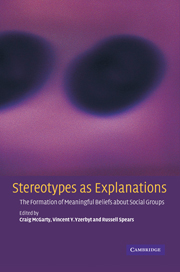Book contents
- Frontmatter
- Contents
- List of figures
- List of contributors
- Preface
- 1 Social, cultural and cognitive factors in stereotype formation
- 2 Stereotype formation as category formation
- 3 Subjective essentialism and the emergence of stereotypes
- 4 The role of theories in the formation of stereotype content
- 5 Illusory correlation and stereotype formation: making sense of group differences and cognitive biases
- 6 Dependence and the formation of stereotyped beliefs about groups: from interpersonal to intergroup perception
- 7 Four degrees of stereotype formation: differentiation by any means necessary
- 8 From personal pictures in the head to collective tools in the world: how shared stereotypes allow groups to represent and change social reality
- 9 Conclusion: stereotypes are selective, variable and contested explanations
- References
- Author index
- Subject index
5 - Illusory correlation and stereotype formation: making sense of group differences and cognitive biases
Published online by Cambridge University Press: 22 September 2009
- Frontmatter
- Contents
- List of figures
- List of contributors
- Preface
- 1 Social, cultural and cognitive factors in stereotype formation
- 2 Stereotype formation as category formation
- 3 Subjective essentialism and the emergence of stereotypes
- 4 The role of theories in the formation of stereotype content
- 5 Illusory correlation and stereotype formation: making sense of group differences and cognitive biases
- 6 Dependence and the formation of stereotyped beliefs about groups: from interpersonal to intergroup perception
- 7 Four degrees of stereotype formation: differentiation by any means necessary
- 8 From personal pictures in the head to collective tools in the world: how shared stereotypes allow groups to represent and change social reality
- 9 Conclusion: stereotypes are selective, variable and contested explanations
- References
- Author index
- Subject index
Summary
Women are more romantic than men. Scientists are duller than artists. We often make such judgements about groups. Some of these judgements are based on folklore, others are based on observation or experience. When we do rely on observed data how good are we at detecting relationships between group membership and behaviour? Do we find it easy to detect differences between groups? Are our judgements biased? This chapter deals with these issues and focuses on the paradigm that has dominated research on the formation of stereotypic differences between groups over the last three decades: the illusory correlation paradigm. In this paradigm respondents are exposed to a series of behavioural instances each linked to an individual belonging to a specific group. The term illusory correlation refers to perceived associations between attributes and instances other than those contained in the data. In the present case it generally refers to the perception of a stereotypic association of certain features with a given group, typically when the available data is presumed to give little evidence for this (hence ‘illusory’).
Detecting relationships between events in the environment, between group membership and behaviour, is an essential ingredient of adaptive behaviour. The information derived from these relationships or covariations allow us to make sense of the world by explaining the past, controlling the present and predicting the future (Alloy & Tabachnik, 1984; Crocker, 1981). In these terms, detecting contingency is clearly important for our well-being and even our survival.
Information
- Type
- Chapter
- Information
- Stereotypes as ExplanationsThe Formation of Meaningful Beliefs about Social Groups, pp. 90 - 110Publisher: Cambridge University PressPrint publication year: 2002
Accessibility standard: Unknown
Why this information is here
This section outlines the accessibility features of this content - including support for screen readers, full keyboard navigation and high-contrast display options. This may not be relevant for you.Accessibility Information
- 6
- Cited by
